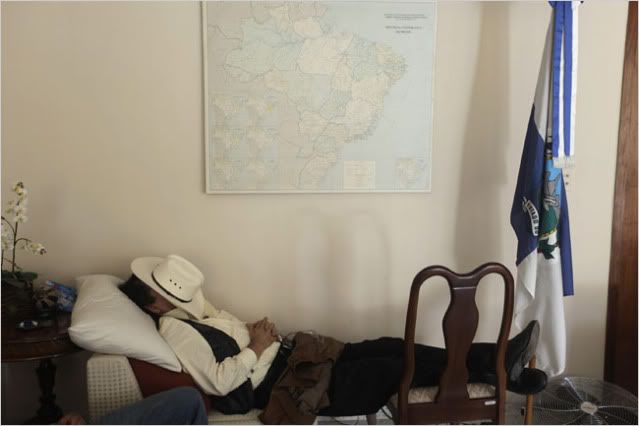The news of an impending resolution to Honduras’s coup was hopeful, but apparently too good to be true. Today it’s clear that nothing has been decided, that rightful, democratically elected President Manual Zelaya is still stuck in the Brazilian Embassy in Tegucigalpa, and that the negotiations to resolve the crisis are now totally dead. This should not be a big surprise to anyone.
The New York Times reports:
Ousted Honduran President Manuel Zelaya pulled out of talks with the country’s post-coup de facto leaders on Friday, throwing efforts to resolve a months-long political crisis back to square one.
Zelaya pulled his representatives out of meetings with envoys of de facto leader Roberto Micheletti that were the latest in a series of attempts to resolve the political deadlock sparked by a June 28 military coup.
“As of now we see this phase as finished,” Zelaya envoy Mayra Mejia said shortly after midnight (7 a.m. British time) at the hotel where both sides have been negotiating for three weeks.
All attempts to reach a deal have snagged over whether Zelaya can return to power for the last few months of his term, which ends in January.
“Post-coup de facto leaders” is an interesting turn of phrase. I prefer “golpistas.” Or if you prefer, “leaders of the coup d’etat.” But the bottom line is that no matter what you call Roberto Micheletti and his friends in the oligarchy, their coup continues despite virtually universal condemnation. And it only has to continue, as far as the golpistas are concerned, until November 29, 2009, the present date for elections of a new president. That date is right around the corner. The golpistas have no intention, none whatsoever of restoring Manual Zelaya to his rightful presidency. That is the one, single thing they will not permit. And, unfortunately, that’s the one single step the rest of the world believes is an essential first step to end the crisis.
This is what is called a deadlock.
The rest of the world may insist on restoration of Zelaya to the presidency as an initial step, and it may insist as well that the coup’s running the national election in November undermines the legitimacy of the “democratic election.” But the golpistas don’t see it that way. At all. To them, surviving all the diplomatic initiatives and the sternly worded verbal condemnations and the impounding of funds until there’s an election is the goal. They’ll happily argue about the legitimacy of the election after its been held. And nothing is going to budge them from their present stranglehold on Honduras’s government or move them to restore Manual Zelaya to the presidency.
The golpistas would rather clamp down on the demonstrators than move their position toward a possible resolution. This is what one should expect of them. The burden of the unrest, and especially the present damage to the Honduras economy fall on the poorest people in Honduras. These are not the golpistas. They are quite powerless to resist the military government and the US equipped and trained army.
And what of the US and it’s recently announced “better relations” with Latin America?
The deadlock in Honduras is proving a challenge for U.S. President Barack Obama after he vowed better relations with Latin America. Washington suspended the visas of more figures in the de facto government this week to pressure a settlement.
“The two sides need to seal this deal now. Time is running out,” U.S. State Department spokesman Ian Kelly said on Friday. “We have not given up on a deal yet … We are focussed on these guys sitting down and agreeing,” he said.
This is nice. There is no deal to seal. There is no agreement. And now there are no talks. Put another way, US insistence on an agreement is and continues to be an utter non starter. Similarly, negotiations brokered by Oscar Arias. Similarly, the impounding of non-essential US aid to Honduras. The golpistas have raised their middle finger and most observers are making believe it’s to tell which way the wind is blowing.
————————————————
simulposted at The Dream Antilles

